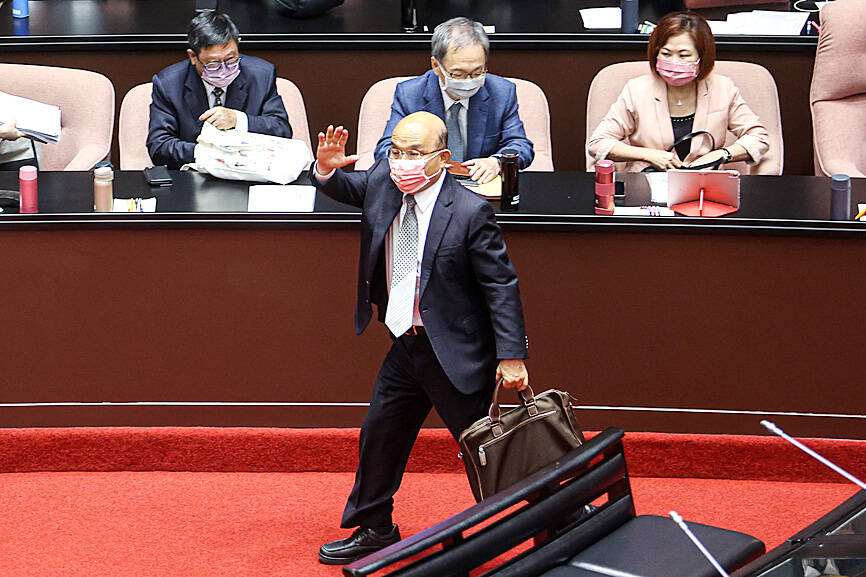Government agencies plan to bolster cross-departmental efforts to target criminal activities at their source, Premier Su Tseng-chang (蘇貞昌) told legislators after New Power Party (NPP) Legislator Chiu Hsien-chih (邱顯智) expressed concern that Taiwanese laws are too conservative in dealing with cryptocurrencies.
The Global Anti-Scam Organization and victims of cryptocurrency scams have criticized Taiwan’s prosecutors and law enforcement officials for being reluctant to contact cryptocurrency exchange platforms for assistance, Chiu said.
Chiu commended the government’s efforts in fighting recent Cambodia-based fraud rings, but said that more must be done to enable law enforcement agencies to freeze cryptocurrency transactions, which is a primary method of transferring funds for illicit activities.

Photo: Reuters
The Criminal Investigation Bureau is waiting until this month to file its first-ever request to freeze cryptocurrency transactions, while other countries can already take such measures, Chiu said.
The bureau reasons that there is no legal basis or precedent for taking such action, he said.
Regarding the assets the bureau is looking to freeze, the cryptocurrency exchanges are based offshore and the electronic wallets are not owned by Taiwanese, creating problems in jurisdiction and making notices difficult to deliver, Chiu said, citing bureau officials.

Photo: CNA
However, the journal Criminal Policies and Crime Prevention in December last year said that transactions using blockchain technology are transparent at every level, and it is possible to track down the recipient of the funds, he said.
Cryptocurrency exchanges have demonstrated a willingness to work with law enforcement, Chiu said, citing the example of Binance, the exchange with the world’s largest daily trading volume, which has established a search-and-assist system used by law enforcement agencies.
Binance’s system supports traditional Chinese language searches, he added.
Taiwan’s law enforcement agencies have shown less commitment than cryptocurrency agents in tackling fraud, Chiu said.
Minister of Justice Tsai Ching-hsiang (蔡清祥) said that the High Prosecutors’ Office is collaborating with cryptocurrency exchanges, and can access transaction data.
The Ministry of Justice operates a staff education program that involves overseas training, which would aid prosecutors.
Su said that the government is striving to ensure that criminal cryptocurrency activity is controlled and regulated.

CHAOS: Iranians took to the streets playing celebratory music after reports of Khamenei’s death on Saturday, while mourners also gathered in Tehran yesterday Iranian Supreme Leader Ayatollah Ali Khamenei was killed in a major attack on Iran launched by Israel and the US, throwing the future of the Islamic republic into doubt and raising the risk of regional instability. Iranian state television and the state-run IRNA news agency announced the 86-year-old’s death early yesterday. US President Donald Trump said it gave Iranians their “greatest chance” to “take back” their country. The announcements came after a joint US and Israeli aerial bombardment that targeted Iranian military and governmental sites. Trump said the “heavy and pinpoint bombing” would continue through the week or as long

TRUST: The KMT said it respected the US’ timing and considerations, and hoped it would continue to honor its commitments to helping Taiwan bolster its defenses and deterrence US President Donald Trump is delaying a multibillion-dollar arms sale to Taiwan to ensure his visit to Beijing is successful, a New York Times report said. The weapons sales package has stalled in the US Department of State, the report said, citing US officials it did not identify. The White House has told agencies not to push forward ahead of Trump’s meeting with Chinese President Xi Jinping (習近平), it said. The two last month held a phone call to discuss trade and geopolitical flashpoints ahead of the summit. Xi raised the Taiwan issue and urged the US to handle arms sales to

A magnitude 5.6 earthquake struck off the coast of Yilan County at 12:37pm today, with clear shaking felt across much of northern Taiwan. There were no immediate reports of damage. The epicenter of the quake was 16.9km east-southeast of Yilan County Hall offshore at a depth of 66.8km, Central Weather Administration (CWA) data showed. The maximum intensity registered at a 4 in Yilan County’s Nanao Township (南澳) on Taiwan’s seven-tier scale. Other parts of Yilan, as well as certain areas of Hualien County, Taipei, New Taipei City, Taoyuan, Hsinchu County, Taichung and Miaoli County, recorded intensities of 3. Residents of Yilan County and Taipei received

Taiwan has secured another breakthrough in fruit exports, with jujubes, dragon fruit and lychees approved for shipment to the EU, the Ministry of Agriculture said yesterday. The Animal and Plant Health Inspection Agency on Thursday received formal notification of the approval from the EU, the ministry said, adding that the decision was expected to expand Taiwanese fruit producers’ access to high-end European markets. Taiwan exported 126 tonnes of lychees last year, valued at US$1.48 million, with Japan accounting for 102 tonnes. Other export destinations included New Zealand, Hong Kong, the US and Australia, ministry data showed. Jujube exports totaled 103 tonnes, valued at